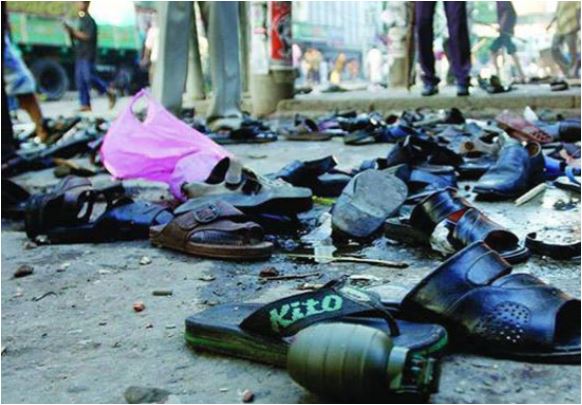
By Tareq Al Naser
DHAKA, Aug 20, 2022 (BSS) – Chief prosecutor of August 21, 2004 grenade attack case Advocate Syed Rezaur Rahman today said the trial proved this was one of history’s most gruesome “state-backed organized crimes”, expecting its quick disposal in the High Court after the mandatory judicial review.
“In the history of organized crimes, the case will be recorded as one of the most gruesome ones, backed by the state-machinery,” Rahman told BSS coinciding with the 18th anniversary of the attack.
The trial court delivered its verdict in the case on October 11, 2018, handing down death sentences to 19 accused and life term to another 19 while the case was now pending for a mandatory review in the High Court.
“The paper book has been readied, we expect the (death reference and appeal) hearing to start soon,” said Rahman.
He added, however, the trial process was expected to raise confidence among justice seekers about the rule of law “though some of them may think some culprits have escaped the justice”.
He said the extent of the crime appeared evident as the long list casualties included journalists, lawyers, and people of other professions and social strata apart from the political leaders and activists including Ivy Rahman, Awami League’s women front president.
Rahman led a team of 12 lawyers in prosecuting the accused in the Fast Trial Court 1 of Dhaka with Shahed Nuruddin being the judge.
BNP’s acting chairman Tarique Rahman, declared as a fugitive by the court, two former ministers and some former top intelligence officials were found guilty and handed down various punishments for the attack.
Tarique and 18 others were sentenced to life in prison while former state minister for home Lutfozzaman Babar and 18 others were given death penalty on charges of killing through criminal conspiracy.
Rahman’s comments came as officials familiar with the case said three of the capital punishment recipient convicts including outlawed Harkatul Jihad Bangladesh HuJI’B) Mufty Hannan were executed by now in two other cases.
The trial unveiled the conspiracy behind the attack exposing evidence that the then regime masterminded its shocking plot and subsequently made desperate efforts to protect the assailants.
The evidence and testimonies of crucial witnesses including the then Directorate General of Forces Intelligence (DGFI) chief unfolded gradually the plot as the protracted trial was underway.
DGFI’s then director general now retired major general Sadik Hassan Rumi appeared as a crucial witness in the court and said attack perpetrators were protected under higher political authority’s directives.
“I was asked not to catch them (culprits) . . . There was no dearth of efforts on my part to unearth the plot but I was repeatedly obstructed,” Rumi told the trial court.
Rumi insisted the ex-premier Khaleda Zia appeared annoyed and literally rebuked him as he wanted to talk to her on the attack issue and subsequent investigations.
“From where you gathered the ridiculous information . . . what is your headache if Tajuddin (a key attack suspect) goes to Pakistan or anywhere else?” Rumi recalled Begum Zia telling him as he tried to confirm a report that if she herself ordered his safe passage abroad.
Key accused of the case militant Harkatul Jihad (HuJI) chief Mufti Abdul Hannan in his confessional statement gave a detailed description how the plot was orchestrated as his outfit was entrusted with the task to kill Sheikh Hasina and other front-ranking Awami League leaders.
His long statement depicted the direct involvement of Tarique Rahman, the then junior home minister Lutfozzaman Babar and former deputy minister Abdus Salam Pintu.
“Tarique Zia (Rahman) assured us of giving all kinds of cooperation . . .then we held a series of secret meetings at different places including Mohammadpur to kill Sheikh Hasina and Awami League leaders,” Hannan had said in his pre-trial confessional statement before a magistrate.
Hannan, who is by now hanged after trial for attempt on former British High Commissioner Anwar Chowdhury’s life, said the plotters subsequently learnt that Awami League would stage an anti-terrorism rally on August 21, 2004.
“We took a plan to stage an attack on Sheikh Hasina and Awami League leaders there and decided to meet Tarique Zia again to execute the plan,” he said.
Sheikh Hasina in a public address later said another apparently new point recalling that Awami League volunteers were generally engaged in maintaining security of any such party rally in those days and they used perform it from nearby buildings rooftops.
“But on that day they (the volunteers) were not allowed to get on the rooftops of the buildings as those were closed. So it’s clear that who were involved in the attack,” she said.
According to witnesses and subsequent investigations police actions appeared mysterious immediately after the attack when they started lobbing tear gas and using batons on the crowds instead of extending hands for the victims.
“The aim of this was to allow attackers to flee without any hindrance,” Sheikh Hasina said.
Tarique Rahman, now in London, and 17 others are being tried in absentia as they “failed” to appear and they were earlier declared “absconding” to evade justice.